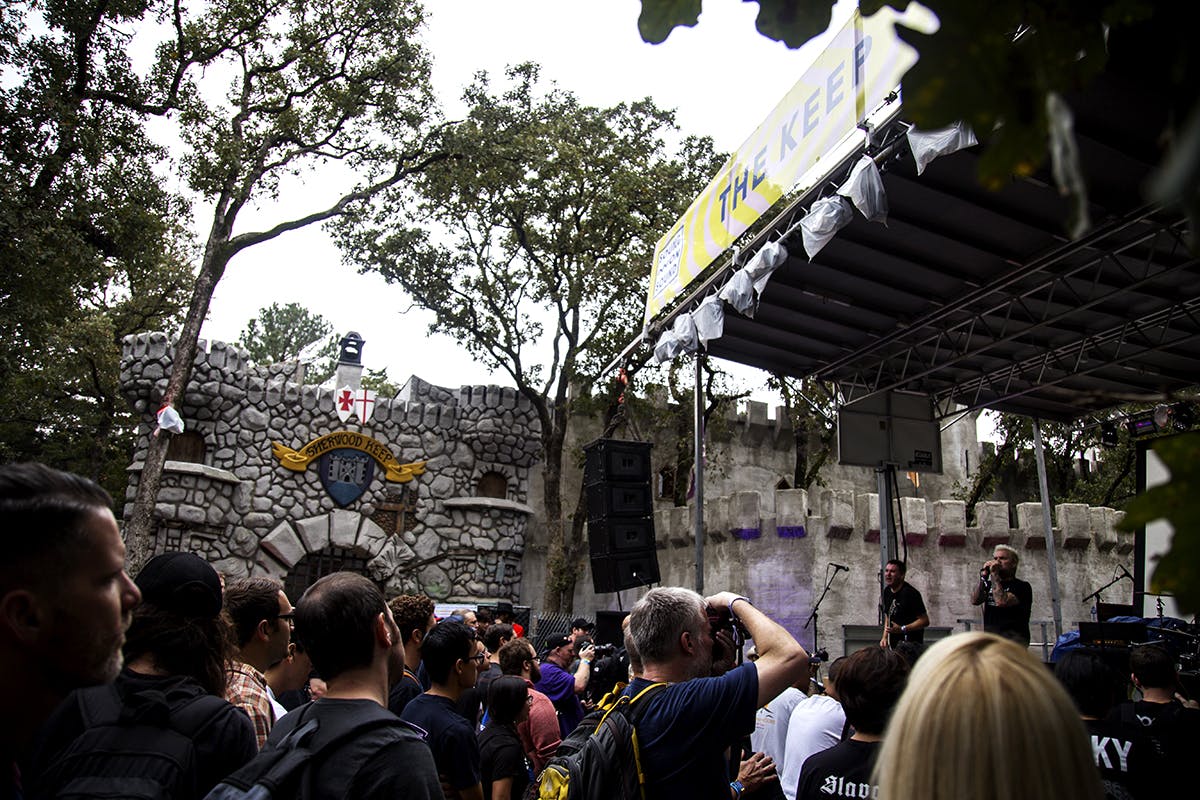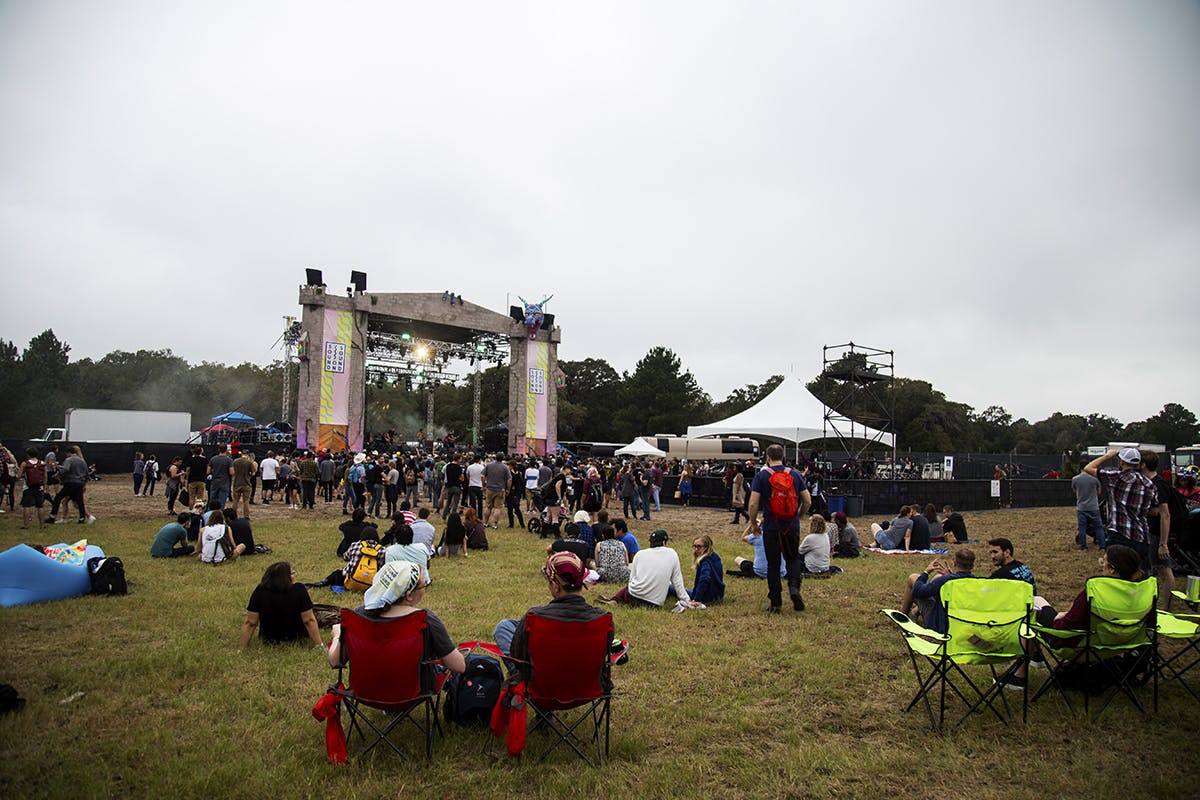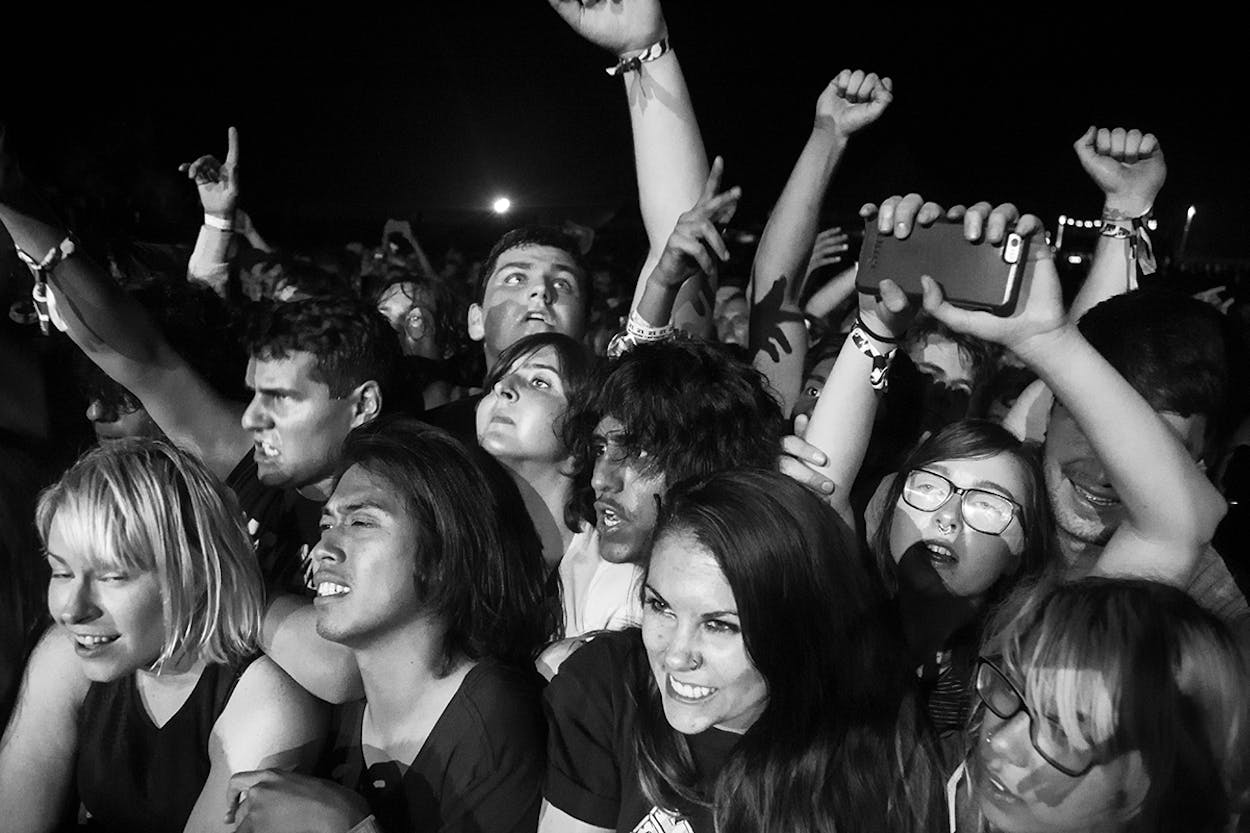Ten years ago, if you were a music lover who wanted to spend a weekend (or a week) at a music festival bouncing from stage to stage it meant a trip to Austin. SXSW has a few decades under its belt, but the more typical outdoor music festival is a relatively new phenomenon in the U.S. They’ve long been a staple in Europe and the U.K., but California’s desert fête, Coachella—which launched in 1999—didn’t turn a profit until several years in.
At that point, though, the industry saw the potential, and festivals like Bonnaroo and Austin City Limits buoyed a major bubble in the years that followed. Lollapalooza originated in the early nineties as a package tour, and planted its stake in Chicago with a weekend-long event booked by Austin-based C3 Presents. In 2006 Transmission Events launched their own event in Austin, Fun Fun Fun Fest, and in 2009, Houston’s Free Press Summer Fest started to give music fans outside of the capital a chance to see an impressive lineup without having to travel.
These days, the business is booming. Austin City Limits has grown from a two-day event in its first year to a three-day festival on two consecutive weekends. Free Press Summer Fest has expanded with a second festival, December’s Day For Night. El Paso got into the act in 2011, and its Neon Desert has been successful at bringing big-name headliners to the Texas-New Mexico border. Utopia, Texas hosts UtopiaFest, and Denton’s Oak Street is the home to Oaktopia. In McAllen, Galax Z Fair brings SXSW acts down to the Valley every March. The list goes on.
One star missing from the constellation of 2016 music festivals in Texas is Fun Fun Fun Fest. Earlier this year an internal rift split Transmission’s founders into their own booking entity, Margin Walker Presents, while Transmission remains a special events production company. The name and the rights to producing a fall music festival in Austin remained with Transmission, though, which means that the Margin Walker team announced a successor fest to Fun Fun Fun—Sound On Sound, which took place at the beginning of November, at the grounds of the Sherwood Forest Fair renaissance festival 35 miles outside of Austin in McDade.
The first year of the festival was mostly successful. The venue was an intriguing backdrop for the event, with the 55-minute commute to the grounds mitigated by the fact that the last fifteen minutes of the car (or shuttle) ride was along a winding dirt path called Potato Road, past a collection of small homes and a whole lot of cows—in case you forgot that you were in Texas—and into the forest.
The grounds themselves were a part of the event too. Like axe-throwing? They had axe-throwing. Into colorful medieval decorations or vendors in costumes selling turkey legs? You were in the right spot. If you and your friends were kicking it and didn’t mind meeting a stranger, minstrels prowled the grounds looking for people to tell stories to.

“I hate to use the term ‘magical’ because it sounds a little hokey, but the location was everything we wanted it to be,” Margin Walker head Graham Williams says. “Especially after doing a festival in a park downtown for ten years. There’s such a similarity between what a festival is anywhere in the country, and this felt unique and unlike any other.”
In rained during Sound on Sound’s inaugural weekend, which raised challenges. On Saturday a wreck on 290 delayed the shuttles returning from the grounds to pick up guests waiting in Austin. On Sunday the threat of lightning forced an evacuation that cleared the grounds for a few hours. That might have been worse had it happened at a downtown festival, though, as the lack of a noise ordinance or a curfew meant that Sound On Sound could delay and then run their festival later on into the evening. Things running late were a theme throughout the weekend though—on Friday, for example, the festival failed to anticipate the demand for the shuttle during the afternoon, leading to long waits until they upped the capacity and frequency of the buses; on Saturday night, meanwhile, the main stage fell behind early in the evening and continued to lag throughout the night.
These are things that happen at music festivals, and the Sound On Sound audience didn’t seem to mind too much. Despite being a new company, the Margin Walker team has a strong reputation for their events—and events like Sound On Sound might be where the music festival industrial complex is heading.
That’s true in literal ways. Just a few days after Sound On Sound ended, C3 Presents announced Middlelands Festival, which will be held on the grounds of the Texas Renaissance Festival in Todd Mission, just north of Houston. That festival promises “three days of eclectic artists and four nights of camping” in a collaboration between C3 and Los Angeles-based Insomniac, which focuses largely on the EDM-based Electric Daisy Carnival (and which shares a parent company with C3 in LiveNation). Middlelands isn’t Electric Daisy Carnival Texas, though, and the release from C3 is slight on details outside of, er, the fact that it also takes place at a renaissance faire between Austin and Houston.
It’s also true in ways that don’t explicitly involve setting up shop at another renaissance festival. In mid-October, Fortress Presents announced the Fortress Festival as a two-day fest at the Modern Art Museum of Fort Worth—with Margin Walker handling booking for the fest.
“We have offices in Dallas, so we do shows around DFW year-round,” Williams says. “It’s definitely a smaller concept [than Sound on Sound], with one or two stages, on a day thing. But it could get similar in size—DFW is huge, just massive compared to Austin. It won’t be similar in scope, but a number of people could still show up. We see that from time to time in different cities—at its height, Free Press Summer Fest was bigger than Fun Fun Fun Fest ever was in terms of ticket sales. There could be a good amount of folks coming out to a fest like this.”

Music festivals are one of the bright spots in a struggling music industry, and the model for them is changing. Austin City Limits was still a success in 2016, certainly, but many festivals around the country similar in scope are experiencing a downturn. Bonnaroo 2016 landed with a thud—the festival sold 45,537 tickets for this summer’s edition, which is down 28,000 from the previous year. But that doesn’t necessarily mean that people don’t want to attend musical festivals anymore, and could be a symptom of the growing number of festivals available across the country. In practical terms, that means that fests in places like Manchester, Tennessee—where Bonnaroo happens, 65 miles outside of Nashville—might struggle to attract tourists to the same extent that they did in the past.
“Bonnaroo is half of its usual attendance. It’s the biggest single-weekend festival, and it went from 90,000 [at its height in 2011] to 45,000. Sasquatch [in George, Washington, 150 miles from Seattle and 250 miles from Portland] used to do 25,000-30,000 people, this year it did 14,000. Even at ACL, you could buy Sunday tickets each weekend,” Williams says. “There are so many festivals happening in so many cities, and there are fests that built their model around getting fifty percent of their tickets from out of town. Now that every city has a smaller version of the same thing, it’s not worth the drive, hotel, and costs when there’s something similar in their town.”
That sounds like a bummer, but Williams sees hope for music fans who want to enjoy events like Day For Night, Neon Desert, Sound On Sound, Free Press Summer Fest, or other smaller events. “Big behemoth festivals are shrinking and changing. The lineups aren’t as big, but there’s still a market for it. All the big events have got people so excited about the concept that more people want to do it. Cities want the tourism and tax dollars,” he says. “There are a lot of other people saying, ‘Hey, come to our city and do an event here.’ Neon Desert has a solid group of people coming out to it. Tons of people go out to that festival. Ten years ago, if I said I wanted to do a festival in El Paso, that wouldn’t have convinced people. Too many that are trying to be too big can be pretty risky. But we see a lot of these things happen in each city, and Texas has a lot of cities with a huge population, and a lot of fans of music and art.”







